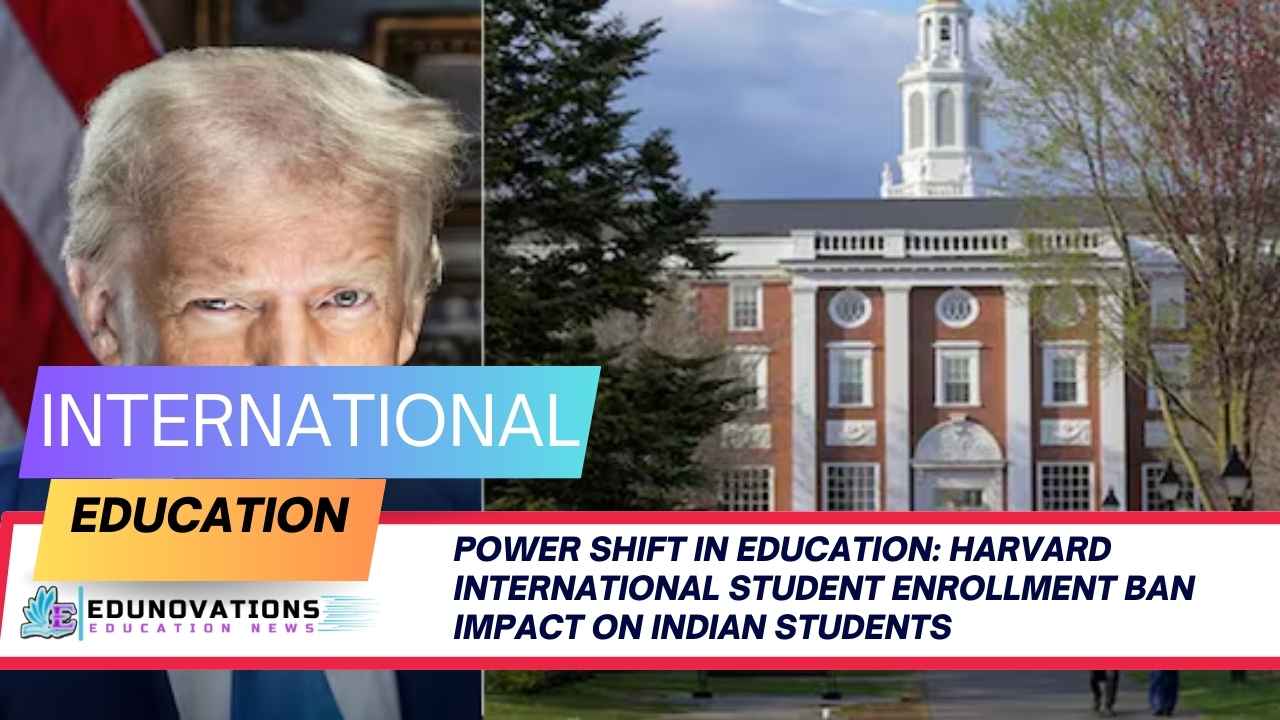Power Shift in Education: Harvard International Student Enrollment Ban Impact on Indian Students
In a rapidly changing global education landscape, the Harvard international student enrollment ban impact on Indian students is becoming a focal issue. Triggered by a Trump-era directive targeting international students in the U.S., Indian aspirants now face a future riddled with uncertainty, disrupted dreams, and major decision-making dilemmas.
The U.S. has long been the preferred destination for Indian students seeking world-class education. Harvard University, in particular, has symbolized academic excellence and opportunity. However, recent moves from U.S. policymakers have cast a shadow over this dream. The enforcement of policies that limit foreign enrollments—particularly affecting prestigious institutions like Harvard—has led to widespread concern.
The Trump Administration and SEVP Revocation: A Legal Earthquake
The Trump administration’s SEVP certification revocation and Indian student concerns remain central to this development. SEVP, or the Student and Exchange Visitor Program, regulates how international students can live and study in the U.S. In 2020, the administration attempted to revoke SEVP certification for institutions holding online-only classes, placing thousands of Indian students in limbo.
Though legal battles eventually stalled this directive, the chilling effect persists. U.S. immigration policies continue to evolve, and Indian students planning to study abroad now navigate more complex visa and enrollment processes. The outcome of such policies often disproportionately impacts students from developing countries, especially those dependent on scholarships and part-time jobs abroad.
Toppers Use Mind Maps to score more than 95%
NCERT Class 11th Biology Mind Maps
Add to cartOriginal price was: ₹199.00.₹75.00Current price is: ₹75.00.NCERT Class 11th Chemistry Mind Maps
Add to cartOriginal price was: ₹199.00.₹75.00Current price is: ₹75.00.NCERT Class 11th Commerce Mind Maps
Add to cartOriginal price was: ₹999.00.₹199.00Current price is: ₹199.00.NCERT Class 11th Maths Mind Maps
Add to cartOriginal price was: ₹199.00.₹75.00Current price is: ₹75.00.
Purchase Today

Understanding the Impact on Indian Aspirants
The Harvard international student enrollment ban impact on Indian students is far-reaching, touching every aspect of their academic, financial, and emotional lives. Indian students who once viewed Harvard and similar U.S. institutions as the pinnacle of educational opportunity are now reevaluating their futures under a cloud of policy unpredictability.
Visa Uncertainty
One of the most immediate consequences of the Harvard international student enrollment ban impact on Indian students is the surge in visa-related complications. Embassy interviews are now more stringent, with students facing exhaustive documentation checks and prolonged processing times. Many visa applications are being held up or denied without clear reasons, creating widespread anxiety among applicants.
Mental Health Stress
The Harvard international student enrollment ban impact on Indian students has also sparked a mental health crisis. Dreams that were nurtured for years have been jeopardized in mere months. The constant fear of cancellation, travel restrictions, and future uncertainty is taking a toll. Indian students, who are often under immense parental and societal pressure to succeed abroad, are now experiencing heightened levels of anxiety and depression. The lack of clarity from institutions further amplifies this stress.
Financial Repercussions
The financial strain of the Harvard international student enrollment ban impact on Indian students cannot be overstated. Families invest lakhs—sometimes crores—in preparing their children for education in the U.S. This includes coaching classes, visa fees, application charges, and non-refundable deposits. When plans are abruptly altered or canceled due to policy bans, these financial commitments turn into losses. Some students had already paid for accommodation and flights, which are often non-recoverable.
Loss of Trust in U.S. Education as a Safe Bet
There is a growing loss of faith in the United States as a stable and student-friendly destination. The Harvard international student enrollment ban impact on Indian students has introduced a level of unpredictability that deters many from choosing U.S. universities. Once seen as a reliable pathway to success, the American higher education system is now viewed with skepticism. Families are beginning to favor countries like Canada, the UK, and Germany that offer more consistent immigration policies and greater transparency.
If you’re seeking dependable resources to restructure your academic path or explore alternatives, visit our:
Notes to boost your preparation efficiently.RT Courses, Current Affairs, and Notes to stay informed.
NCERT Courses for strong conceptual learning,
Current Affairs to stay informed on policy updates,
What Are the Legal Challenges Against Foreign Student Enrollment Restrictions in US Universities?
Legal advocates and university stakeholders launched an immediate response to the proposed restrictions. The legal challenges against foreign student enrollment restrictions in U.S. universities gained traction, as institutions like Harvard and MIT joined forces to sue the federal government, leading to the eventual withdrawal of the rule.
Key Legal Arguments:
- Violation of Administrative Procedure Act (APA)
- Economic impact on universities
- Human rights implications for international students
This landmark pushback not only provided relief to current students but highlighted the power of legal frameworks to counter anti-immigrant policies. It set a precedent that helps safeguard student interests in future policy debates.
Exploring Options for Indian Students Facing US University Enrollment Bans
As barriers grow, options for Indian students facing U.S. university enrollment bans are expanding:
- Alternative Study Destinations: Countries like Canada, Australia, Germany, and the UK are capitalizing on the U.S. policy uncertainty.
- Online and Hybrid Learning: Platforms offering globally recognized certifications through online learning are gaining traction.
- Deferment or Gap Years: Many students are deferring admissions until political climates stabilize.
For those planning their academic journey, MCQ practice and Video lectures can be vital tools for preparation.
Impact of US immigration policy changes on indian higher education aspirants
The impact of U.S. immigration policy changes on Indian higher education aspirants is profound and multi-dimensional:
- Policy Shifts = Planning Paralysis: Frequent changes have forced students and families to make last-minute shifts.
- Rise in Education Agents and Misinformation: Desperation has led many to fall into the trap of fraudulent education consultants.
- Policy Watch: Increased awareness of policies has become necessary. Aspirants now track immigration updates like exam results.
Use our syllabus tool to keep pace with changes and stay competitive globally.
Expert Insights: What’s Next?
According to Dr. Rohit Singh, a global education expert, “The disruption caused by the enrollment ban has forced students to re-evaluate their study abroad plans. But the long-term opportunity lies in becoming more agile and well-informed.”
He adds, “Indian students must build flexibility into their planning. Look at countries with more transparent immigration laws. Focus on skill-based learning.”
A Snapshot of Current Trends and Statistics
- Over 200,000 Indian students were enrolled in U.S. institutions in 2019.
- In 2020, nearly 70% of Indian student visa applications were delayed or deferred.
- A 2021 survey by ICEF Monitor revealed 56% of Indian students are now actively exploring options outside the U.S.
For additional resources and downloadable PDFs, check our Free NCERT Downloads and Mind Maps.
Internal and External Resource Integration
Internal Resources
External Link
Frequently Asked Questions (FAQs)
1. What is the Harvard international student enrollment ban impact on Indian students?
It disrupts visa processes, adds uncertainty to academic planning, and causes financial and emotional stress for Indian aspirants.
2. Why did the Trump administration revoke SEVP certification?
To pressure universities into conducting in-person classes during COVID-19, impacting online-only international students.
3. How did legal challenges affect the enrollment ban?
Universities like Harvard sued the administration, resulting in the reversal of the SEVP directive.
4. What are the best options for Indian students now?
Exploring Canada, Australia, and online education models can be effective alternatives.
5. Can students reapply after deferring due to the ban?
Yes, most institutions allow deferment and reapplication within 6–12 months.
6. Are immigration policies in the U.S. stable now?
They remain volatile, and students must stay updated on policy changes.
7. How to prepare for alternate countries’ admission tests?
Use platforms like MCQ practice and video lectures to prepare.
8. What mental health support is available for affected students?
Universities now offer online counseling and international student support groups.
9. Can students recover financial losses from canceled plans?
It depends on the institution’s refund policies; some offer partial reimbursements.
10. How has the impact of U.S. immigration policy changes influenced Indian student choices?
It has led to diversified destinations and a rise in online education enrollment.













